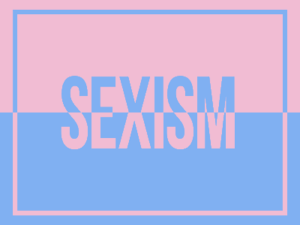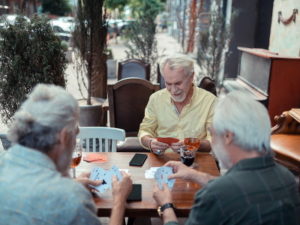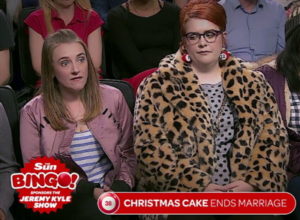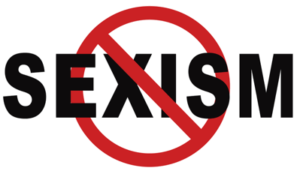Sex-Bias And Misogyny In The Gambling Industry
 The world of gambling has long struggled with sexism. When betting shops first opened on British high streets at the start of the 1960s, they were male-dominated environments. Having grown out of illegal street-run bookmaking businesses, there was an inevitability to the seediness that betting shops would have attached to them, including the fact that they were initially forced to have blacked out windows and be generally unappealing.
The world of gambling has long struggled with sexism. When betting shops first opened on British high streets at the start of the 1960s, they were male-dominated environments. Having grown out of illegal street-run bookmaking businesses, there was an inevitability to the seediness that betting shops would have attached to them, including the fact that they were initially forced to have blacked out windows and be generally unappealing.
Betting shops weren’t allowed to improve their appearance until further gambling legislation was introduced in 1986, so in many ways it is hardly surprising that it is an industry dominated by sexism. Whether it be adverts that predominantly feature men betting on the likes of football or bingo sites that actively appeal to women, misogyny in gambling is an issue the industry is still wrestling with.
Where Gambling Emerged From
 It’s easy to forget now, on account of the prevalence of online betting sites, but gambling has not always been an industry that was so readily placed under the spotlight. Prior to the Betting & Gaming Act of 1960, bookmakers were not allowed to operate legally on the high streets of Britain. Instead, the only legal bookies were the ones based on racecourses, with telephone betting also allowed in certain circumstances.
It’s easy to forget now, on account of the prevalence of online betting sites, but gambling has not always been an industry that was so readily placed under the spotlight. Prior to the Betting & Gaming Act of 1960, bookmakers were not allowed to operate legally on the high streets of Britain. Instead, the only legal bookies were the ones based on racecourses, with telephone betting also allowed in certain circumstances.
The biggest bookmakers rushed to open shops, with one or two exceptions, and within six months there were 10,000 or so of them on the high street. Richard Austen Butler, better known as ‘Rab’, was the Home Secretary at the time of the law change. He was insistent that betting shops should have ‘dead windows’, meaning that they were to be blacked out or shuttered, ensuring that there was nothing enticing about them whatsoever.
Soon these darkened shops were filled with men, heading there to spend their wages and smoke. They were not a place where women felt comfortable or even welcomed, with Butler noting in his memoirs,
“The House of Commons was so intent on making betting shops as sad as possible, in order not to deprave the young, that they ended up more like undertakers’ premises.”
Though gambling grew as a business with every passing year, to the point that William Hill was in the FTSE 100 by 2004, it failed to improve its image a vast amount during that time. The launch of the National Lottery in 1994 caused the industry to move with the times a slight degree, but it was still one that looked to appeal to men first and foremost. Little wonder, therefore, that sexism has long been an issue it has suffered with.
A Male Dominated World
 Picture a movie in which there is some gambling taking place. Whether you’ve thought of a James Bond film or Ocean’s Eleven, the odds are that you’ll have imagined a picture in which it is mostly men sat around a table and gambling. Women are typically used as eye-candy, hanging on the arm of their male companions or maybe being asked to blow on the dice before their rolled onto the craps table.
Picture a movie in which there is some gambling taking place. Whether you’ve thought of a James Bond film or Ocean’s Eleven, the odds are that you’ll have imagined a picture in which it is mostly men sat around a table and gambling. Women are typically used as eye-candy, hanging on the arm of their male companions or maybe being asked to blow on the dice before their rolled onto the craps table.
There is no one reason why gambling is a typically male-dominated industry. There are a number of factors that contribute to the fact that it’s men who are mainly seen betting, including the fact that men are more likely to have free time than their female counterparts. In 2009, a study in the United States of America revealed that women have less free time and the time that they do have free comes in smaller doses.
We should also remember that women are, typically speaking, paid less than men. According to the Office For National Statistics, the gender pay gap amongst all employees was 15.5%. That means that men tend to have more disposable income than women, for no reason other than the fact that they are paid more even when doing the same, or similar, jobs, allowing them to spend more on gambling.
There’s also evidence that men are more likely to engage in risky behaviour than women, making the desire to gamble a natural one. Men will tend to gamble for the excitement of the activity, whilst women use gambling to escape the stress of their world. Men therefore associate gambling with positive feelings, whilst women will associate it with more negative ones and therefore be less inclined to engage in it.
The final thing of note when it comes to how men and women approach gambling is that men start at a much younger age than women. The average age of a male punter when they start out on their betting path is 20.4, whilst for women it’s 34.2. That’s 14 years of betting for men that women tend to miss out out, perhaps in part because more is expected of women by society than their male counterparts.
Women Bet On Different Things
 There are obviously some women that bet on football and some men that love bingo, but the simple truth is that male gamblers are more likely to bet on the likes of football, horse racing and other sports. Men are also more likely to engage in table games in a casino than women, which is something that has carried on over into the world of online casinos. Women, it seems, tend to opt for an entirely different form of betting.
There are obviously some women that bet on football and some men that love bingo, but the simple truth is that male gamblers are more likely to bet on the likes of football, horse racing and other sports. Men are also more likely to engage in table games in a casino than women, which is something that has carried on over into the world of online casinos. Women, it seems, tend to opt for an entirely different form of betting.
It is much more likely for a female gambler to engage in the likes of raffles, slot machines, bingo and lotteries than for men to do so. Women are much more inclined to take part in betting activities that are based on luck, whilst men want to try to control the outcome of what it is that they’re betting on. Studies show that men are more comfortable competing against others than women are, which is reflected in their gambling choices.
Target Markets
 Knowing what we now know, is it any surprise that gambling companies tend to target specific markets with their adverts and promotions. There is, after all, little point in a bookmaker producing an advert in which a group of women place bets on a football match if the people that the advert is aimed at aren’t really going to engage in much football betting. Likewise, using bingo adverts to target men is likely to miss their target.
Knowing what we now know, is it any surprise that gambling companies tend to target specific markets with their adverts and promotions. There is, after all, little point in a bookmaker producing an advert in which a group of women place bets on a football match if the people that the advert is aimed at aren’t really going to engage in much football betting. Likewise, using bingo adverts to target men is likely to miss their target.
The world of ‘woke’ means that many will feel as though men and women should be equally targeted for the adverts that are produced, but that’s not how businesses operate. If a gambling company knows that they’re wasting their money producing a bingo site that is specifically aimed at men, they’re simply not going to do it. Equally, women that wish to bet on horse racing are unlikely to refuse to do it simply because they don’t see other women doing so in an advert.
This is often compounded by the fact that many gambling ads for sports are based around sporting professionals, the majority of which are men. This means naturally that if you are using footballers or managers in adverts (such as Paddy Power’s use of the likes of Jose Mourinho) then these will naturally appeal to men and less to women. Likewise with something like horse racing the majority of jockeys are men, although it is worth noting that BetVictor teamed up with Cheltenham champion jockey Rachel Blackmore in 2021 suggesting there is some motivation to change.
In 2017, a TV advert for the Daily Star’s gambling site, Daily Star Wins, was banned for objectifying women. It saw two men stood at a bar before being ‘whisked away’ to a casino in which there are attractive women wearing tight fitting dresses. A voiceover informs us that card sharks will be pleased that there are ‘female croupiers who can handle that’. It is an advert that reeks of misogyny, yet it is hardly surprising for the industry.
The owner of Daily Star Wins, Bear Group, said that the advert was intended to highlight the fact that croupiers are normally male. Whatever the excuse that was produced, the truth is that the advert suggested women are added extras to the gambling experience and that men are the ones that will want to play on table games and so on. Whilst the sexism was obviously blatant, there’s no getting away from the fact that it’s also based in truth.
The UKGC Wants An End To Sexism
 In 2018, the ICE Totally Gaming event at the ExCel in London came under criticism for using ‘scantily clad’ women on stands in order to promote gambling services and products. The Chief Executive of the United Kingdom Gambling Commission at the time, Sarah Harrison, was unimpressed by what she saw and spoke with senior figures in the industry about addressing the ‘significant stain on the industry’s reputation’.
In 2018, the ICE Totally Gaming event at the ExCel in London came under criticism for using ‘scantily clad’ women on stands in order to promote gambling services and products. The Chief Executive of the United Kingdom Gambling Commission at the time, Sarah Harrison, was unimpressed by what she saw and spoke with senior figures in the industry about addressing the ‘significant stain on the industry’s reputation’.
Harrison said,
“This is an industry where we have a number of talented, powerful and successful women. Yet from walking around the exhibition you wouldn’t know this; instead you saw men representing their companies wearing expensive tailored suits whilst their female colleagues were expected to wear nothing more than swimsuits. I say bring this to an end now. And to go further, any future participation by the Gambling Commission in events like this will depend on there being change.”
The European Casino Association and Clarion Gaming, the two companies responsible for organising the event, backed the UKGC by writing an open letter the industry. They said,
“In the spirit of the 21st century, when both women and men play strategic and decision-making roles in businesses, we encourage all exhibitors to mindfully represent support staff promoting their products at the show in a non-offensive and non-stereotyping way.”
The letter continued,
“For both organisations, it is clear that presenting a modern and diverse gaming industry should be at the heart of the show. For this to be successful and ensure that all participants feel equally welcome, the respectful representation of genders is crucial.”
It was clear that scantily clad women and pole dancers should not be used to sell gambling products, but that doesn’t change who the target audiences are.
Things Are Improving
 Both in terms of advertisements and the manner in which women are treated in the gambling industry, things are improving. Adverts for horse racing meetings are far more likely to contain a proportionate amount of women, for example, whilst events such as the Grand National often result in newspapers that simply wish to criticise female attendees being given short shrift by everyone in attendance.
Both in terms of advertisements and the manner in which women are treated in the gambling industry, things are improving. Adverts for horse racing meetings are far more likely to contain a proportionate amount of women, for example, whilst events such as the Grand National often result in newspapers that simply wish to criticise female attendees being given short shrift by everyone in attendance.
There is obviously still a long way to go until any sort of equality is reached, but the same is true of men and women in society in general so it’s hardly a shock that it is true of gambling companies. Women are starting to appear in adverts for gambling products as players, rather than just bystanders, though it remains the case that most betting ads will predominantly involve men placing wagers on sporting events rather than women.
We All Have A Part To Play
 There is a simple truth about sexism in the betting industry, which is that it is sometimes nothing to complain about. Adverts for sports betting don’t say that women shouldn’t place bets or in any way seek to actively put down female bettors. Instead, they are designed to target men, which makes sense because men use the majority of the products on offer and therefore are the ones that should be actively targeted.
There is a simple truth about sexism in the betting industry, which is that it is sometimes nothing to complain about. Adverts for sports betting don’t say that women shouldn’t place bets or in any way seek to actively put down female bettors. Instead, they are designed to target men, which makes sense because men use the majority of the products on offer and therefore are the ones that should be actively targeted.
We need to be careful to ensure that we don’t get into a habit as a nation of complaining about everything and expecting equality in all areas. That works both ways, of course. Men complaining about not featuring in tampon adverts should be laughed out of the room, just as women annoyed that they don’t have men’s shaver advertisements aimed at them should not be taken overly seriously by those in the advertising industry.
It is absolutely right that women should be represented in television adverts for gambling products and that they should be there as more than just eye-candy. Women should be seen to be just as engaged in betting on sporting events as men, even when they’re not the ones that do it in the majority of instances. That being said, advertisers shouldn’t be forced to feature people that they know won’t engage with their product if it’s pointless to do so.
We all have a part to play in ensuring that the conversation around sexism in the betting industry is a sensible one. We can’t be too engaged in being outraged about everything, just as we need to ensure that we fight the right battles when it comes to equality. In the gambling industry, more needs to be done to offer representation to women in a manner that is true to how they actually engage with the various products on offer.



